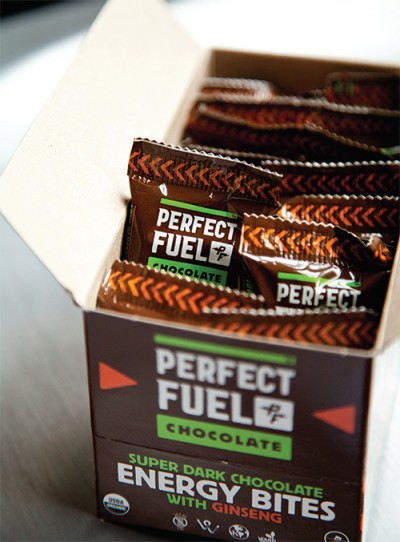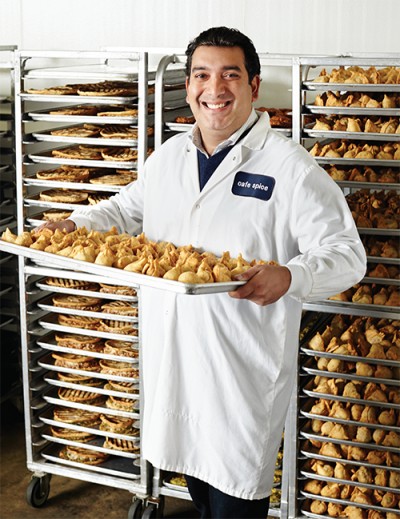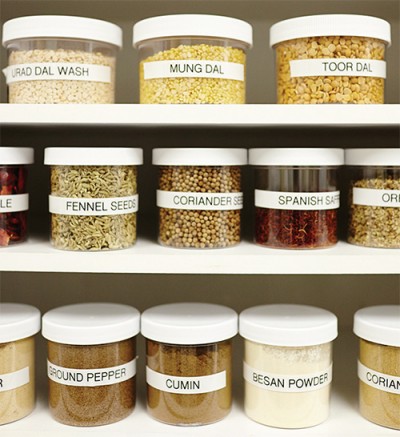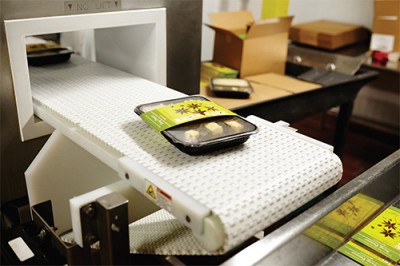

Photo: Pat Piasecki
A bicycling fan, Miles Masci, MBA’11, co-founder of Perfect Fuel Chocolate, maneuvers the streets of Boston to make local deliveries.
A popular homemade snack. A favorite family recipe. A void in the fill-in-the-blank market crying out to be satiated. Interesting ideas for original food products are in no short supply. Each year, more than 20,000 new items reach grocery store shelves.
Coming up with a great idea is simply the beginning. Bringing an idea to fruition is where the real sweat equity begins, especially for small startups, which don’t enjoy the clout of the big food manufacturers. With no volumes to ease costs or proven history of sales, food entrepreneurs must figure out how to source ingredients, design and obtain packaging, mass produce their products without degrading the quality or flavor, distribute their goods, convince buyers to carry their products, manage inventories and expiration dates, and determine pricing that allows for a profit.
Succeed in those endeavors, and they face an even bigger challenge: convincing people to buy their products. On any given day, consumers roaming the supermarket aisles can choose from more than 42,000 items. By some estimates, the failure rate for new grocery products is 70 to 80 percent, with an even higher failure rate for small business launches. “I think probably the biggest problem facing these entrepreneurs is a myopia that the world is waiting for their products,” says Michael Levy, professor of marketing. “But that’s the entrepreneurial mindset.” Just ask these alumni.
Energy to Go
The elevator doors open, and Miles Masci, MBA’11, appears wearing his bicycle helmet with the Perfect Fuel Chocolate logo. He has just finished his commute from Cambridge, Mass. to the Fort Point Channel district in Boston. Perfect Fuel Chocolate, the company Masci joined as a co-founder about two years ago, resides here with 40 other organizations in Space with a Soul, a community office where nonprofits and innovative small companies can collaborate and share costs. Masci also uses his bike for local deliveries of the company’s Energy Bites, attaching a cart to the back. A flag with the company name, made by an intern, helps others see the low-riding cart. “And it’s cool,” says Masci.

Photo: Pat Piasecki
Perfect Fuel Chocolate uses compostable material to create its packaging.
Perfect Fuel Chocolate uses organic dark chocolate paired with various supplements to make nutraceuticals, which are food products that claim to offer health benefits beyond their intrinsic nutritional value. Its first product contains American ginseng, known for enhancing endurance. Masci met founder Nicolas Warren at a party through a Babson friend and felt an immediate connection to the startup’s mission. During two years in the Peace Corps, Masci had worked with cocoa farmers, helping them improve operations, receive organic certification, and increase sales. With an herbalist for a mother, he also appreciates holistic health.
Warren, having developed a business plan and on his third startup, wanted a partner who understood analysis, strategy, and entrepreneurship. Together, the two set about bringing the product to market. As it turns out, being part of Space with a Soul helped them overcome one of the biggest hurdles—landing face time with a grocery store buyer. A space sharer told Masci and Warren about Youth Trade, an organization that helps entrepreneurs under the age of 35 with mission-driven companies get their products on store shelves. Perfect Fuel Chocolate, with its goals of using organic (when possible) and sustainably produced ingredients and enhancing health, became one of the original Youth Trade members. (Babson’s Food Sol is a Youth Trade partner.)
Youth Trade connected them to Whole Foods, and the meeting proved helpful beyond putting product in front of consumers. Not a treat like chocolate bars nor a filling snack like energy bars, Perfect Fuel Chocolate bridges categories. So the Whole Foods buyers suggested placing it in the supplements and super-foods section. The strategy has worked. “We had tested a bunch of channels beforehand,” says Masci. “Put us next to chocolate or energy bars, and we don’t compete well.”
Sales are good, says Masci, especially in the company’s New England base where he and Warren can push the Energy Bites. With no marketing funds, the two conduct store demos and attend local races to hand out samples. They’ve also hired a sales-person to increase their presence in independent health stores throughout New England. The West Coast is another potentially strong market for the company, says Masci, especially the San Francisco area. However, after an impressive launch there last June, sales have slowed. “I was sampling it for the launch, and those stores were outselling our New England stores,” says Masci. “But it’s been tough to keep that momentum because we don’t have the awareness like we do here. We don’t get to go to races out there. The name of the game is awareness.” Getting San Francisco sales on track is a goal for this year.

Photo: Pat Piasecki
Miles Masci, MBA’11
Soon the company also hopes to increase its presence by offering two more versions of its enhanced chocolate, one that contains coffee (for energy) and another with chia (to control appetite). With more SKU numbers in stores, grabbing consumers’ attention should be easier. However, producing the new products has proved difficult. Building their own facility is out of the question: Masci estimates they would need about $500,000. And their current co-packer (a facility that manufactures products for other companies) can’t handle the new products because the mixtures are too thick for its machines. Another twist: potential manufacturers need to be organically certified. But after cold-calling co-packers for more than eight months, Masci believes the new products will be on shelves soon.
Ask Masci what he’s proudest of, and he answers, “That we’re still going!” Perfect Fuel Chocolate also has been the number one seller in its section in multiple Whole Foods stores. Masci loves receiving fan emails from converts. “The best one was, ‘I ate your chocolate during labor, and it got me through it,’” he says. “True story. Someone ate our chocolate while she gave birth. That must have been quite the marathon.”
A Sweet Advantage
Like most college students, Cameron Sheldrake ’12 eats snacks—a lot. But he didn’t like the snacks he could find at Babson. Growing up on a farm, he was used to a fresher flavor in his food. So he decided to make his own tortilla chips using sweet corn, similar to the kind his parents raised, rather than the dried field corn typically used to make packaged tortilla chips. “I just got the idea and cooked up some chips to see if they would taste good,” he says. “And they did.”
Taking entrepreneurship classes, Sheldrake heard from guest lecturers, such as Michael Sands ’87 of LesserEvil snacks, about the consumer packaged-goods industry. Inspired, he decided to try to bring his tortilla chips to market. After hours of research, he won the Babson Entrepreneurial Thought and Action (BETA) Challenge and was accepted into the MassChallenge Accelerator even before launching his company, Off the Cob Sweet Corn Tortilla Chips. Then came the time to put his plans into action. “It’s not as easy as it seems,” says Sheldrake.
Simply finding a co-packer that could manufacture his chips almost killed his idea. He found a plant in Connecticut that seemed like a great fit, but its business was expanding too quickly. “They didn’t have the capacity to deal with me, or the time,” says Sheldrake. Next he tried a smaller manufacturer in the Midwest. “They were great. They didn’t have a lot of big brands but knew you needed innovation to survive, and they liked my product,” says Sheldrake. “They made my first production run. Then they went bankrupt.”
The doors closed, and all the corn and packaging and other supplies that Sheldrake had bought were locked inside. “We have two months to get the product produced, or the ingredients are no good,” he says. “I had to sue to get my materials back.” In the meantime, he spent more money working with another co-packer that couldn’t get the texture of the product right. “Because I use sweet corn, my chip is stickier than other corn chips. It sticks to the machines. They had to do a lot of tests to try and get the mixture right, and they charged us for that,” he says. In the end, the president of the bankrupt company proved helpful to Sheldrake, introducing him to another co-packer in Virginia who now produces Sheldrake’s product.
With his new manufacturer in line, Sheldrake finally received his first run. Currently, he sells through about 25 Whole Foods stores in New England, a relationship he developed from being part of Youth Trade. “We’re trying to raise people’s awareness of how corn is grown and where it comes from. Most people don’t know field corn is subsidized by the government,” says Sheldrake, who only uses organic, non-GMO corn. Sweet corn can be eaten raw, he notes. Try to eat field corn on the cob, and you’ll probably break a tooth. About 99 percent of the corn produced in the U.S. is field corn.
Sheldrake’s chips also are in about 25 independent stores. “We were in about 50 at one point, but a lot of them saw our product as too expensive,” he says. “At $3.99 for a 4-ounce bag, my chips were more expensive than most chips. The problem is sweet corn costs 20 times more than field corn.”
Using sweet corn, however, is Sheldrake’s competitive advantage, so changing ingredients is not an option. Instead, he redesigned the packaging. The previous bag was too big, making the contents seem skimpy. “It affects the customer’s perception of value,” he says. He lowered the price as well to $2.99 to $3.49 for a 4-ounce bag.
Sheldrake also will be in 40 to 60 Wegmans this year, which he hopes will increase sales, and he has set up relationships with three distributors. Additionally, he’s looking to add three new chip flavors. With only one product on shelves, capturing consumers’ attention has been hard.
Sheldrake plans to continue doing as many samplings as he can to drive consumer interest. “The biggest thing is to have people taste it,” he says. “I can’t afford advertising.” A year from now he hopes to have raised money, be offering the new chip flavors, and be in 400 stores all over the Northeast. For now, he’s proud to be in business. “It’s been more than a year,” he says, “and we’re still on the shelves.”
A Family Tradition
In the spring of last year, Niari Keverian, MBA’12, was in a car accident that forced her to leave her job. As she slowly healed, she began looking for a new opportunity. Previously, she had worked for corporate companies such as Staples and Welch’s, where she picked up valuable experience. At Staples, she learned about manufacturing, operations, labor management, and IT. As a brand manager at Welch’s, she learned how to manage profit and loss (P&L); deal with distributors, brokers, and buyers; and run a consumer marketing campaign. But going back to a corporate job didn’t interest Keverian.
Then, through Babson connections, she met Kristina Tsipouras, who was starting ZOOS All Natural Greek Iced Teas. Of Greek descent, Tsipouras would spend summers with her family in Greece and sip iced tea made from her grandmother’s reci-pe. Recognizing the growing popularity of certain Greek foods (think yogurt) in the U.S., Tsipouras decided to bring her grandmother’s iced tea to market.
Keverian, who grew up in an Armenian family, could relate to Tsipouras’ background. “My true passion is in my roots and culture, and we have the same culture,” she says, “so her idea hit home with me.” Not to be persuaded just by emotions, Keverian conducted her own research into the potential market and talked with Tsipouras about the business plan. Soon after, Keverian joined as an equal partner. The niche they hope to capture: freshly brewed iced tea made with tea leaves grown on the mountains of Greece as well as other natural ingredients, with an emphasis on the tea’s health benefits. By March, they hope to have three flavors of iced tea—original, peach, and lemon—on store shelves.
To make sure Tsipouras’ family recipe would translate to mass production, the two hired a food scientist to develop formulas for the teas that can be produced on mainstream equipment and a consultant to help them find a co-packer. “We worked for months with the food scientist to get the flavors to a place where we wanted them,” says Keverian. Most iced teas already on the market are made from a powder, she adds, and aren’t freshly brewed. As such, finding a co-packer that can brew tea proved challenging as well, but the consultant came through for the startup and found a facility. “Brewing keeps the nutrients found in tea high, which is important for our health benefits,” she notes.
With production figured out, the two are focused on trying to land space on retail shelves. Like many local startups with a health-related product, ZOOS has the attention of Whole Foods. But Keverian would like to launch in more than one store, so the company has hired a broker to help set up meetings with retailers such as Stop & Shop, Shaw’s, Wegmans, and Roche Bros. “We’re putting ourselves up against the Honest Teas, Nestles, and Snapples,” she says, “so we want to go with mainstream grocery retailers.” Later this year, they plan to attend industry trade shows to attract more buyers as well as potential distributors and brokers.
Keverian believes that being the only Greek iced tea on the market will gain ZOOS attention. In that vein, the partners chose a blue label for their bottles, capitalizing on the color often associated with Greek products. From her experience at Welch’s, Keverian also knows labels need to be clear and concise. “The tag line says it’s all natural and real brewed. On the side, we have a story that tells how we grew up on the Mediterranean diet, and now we’re sharing this hidden, healthy gem,” she says. The health benefits will be easily identified as well.
Working at a startup suits Keverian, who didn’t realize how unhappy she was in a corporate setting until she became an entrepreneur. Still, she holds no regrets about her career path, having learned so much from her previous jobs, especially with Welch’s. “I didn’t know what field I wanted to be in, and I started to fall in love with food. My family has always been into food. It’s part of my culture and who I am,” she says. “I also wouldn’t know what a food broker is, what it means to go through distribution, what’s happening in the pipeline. I would not know what a true consumer marketing campaign looks like, what a P&L should look like, what margins are supposed to look like in this category. There is a lot of merit to working in a corporate company and then starting your business.”

Photo: Winnie Au
Sameer Malhotra ’00
A New Business Model
After graduating from Babson, Sameer Malhotra ’00 joined his family’s successful Indian food restaurant business. But with entrepreneurial ideas simmering in his head, Malhotra proposed a new business model based on a plan he had developed while at Babson. He wanted to sell fast, fresh Indian food through minimally staffed restaurants using a centrally located commissary to prepare main elements of the dishes. With his father’s approval, Malhotra launched Cafe Spice. The business performed well, and Malhotra opened more restaurants.
Then the Whole Foods in Manhattan decided to launch a full-time, Indian food hot bar. “A light bulb went off in my head that we should be their supplier,” says Malhotra. At first, Whole Foods wasn’t interested, but soon after trying to create the dishes itself came to Cafe Spice for help. Finding trained chefs who understand Indian cuisine is difficult, says Malhotra. With a talented staff already crafting dishes for its restaurants, however, Cafe Spice easily added the Manhattan location. “It was around 2004. We’d seen a lot of similar hot bars in England where Indian food is quite popular,” he says. “But this was the first time such a hot bar was open in Manhattan.”

Photo: Winnie Au
To maintain quality, Malhotra has a worker portion spices for every batch.
The concept took off, as did Malhotra’s relationship with Whole Foods, which added the hot bars to more locations. Malhotra also began servicing universities and cafeterias in office buildings. Cafe Spice moved into a larger 5,000-square-foot facility, but with business booming, the company soon reached capacity. So the family decided to expand, buying 11 acres of land in New Windsor, N.Y. The land included a meat processing plant, which they renovated into a 50,000-square-foot facility that opened in 2007. “As construction was going, our overhead went up, but we were able to sustain it,” says Malhotra. “It was a tough time, because we were doing this during the recession. We used to supply Lehman Brothers cafeteria, and then there was no more Lehman Brothers—and Bear Stearns, but no more. Through it all, Whole Foods supported us. As soon as we were ready, they brought us on, and they keep giving me new projects.”
Malhotra considers Whole Foods a partner more than a customer. “They let me test whatever I like. They come to me with projects, and I come to them with ideas” he says. Malhotra first tested what would prove to be an extremely successful line for Cafe Spice at Whole Foods: fresh grab-and-go prepackaged meals, as distinguished from their frozen counterparts. “The meals were flying off the shelves,” he says. That success led to space for the to-go meals in Big Y, Shaw’s, Stop & Shop, and ShopRite supermarkets. Malhotra then decided that restaurants and offices were no longer the way to go, so he closed those locations (excluding a Cafe Spice at Grand Central Terminal) and focused on selling through hot bars and meals-to-go at universities and supermarkets.

Photo: Winnie Au
You can find Cafe Spice products in stores such as Whole Foods.
Although demand has been high for Cafe Spice products, tricky issues such as distribution and shelf life keep Malhotra busy. In the Northeast, Cafe Spice handles most of its own distribution, but Malhotra wouldn’t mind exiting that side of the business. “The costs are tremendous,” he says, “the fuel, the maintenance, and the more stops you add, the higher the costs.” But the trucks also give Malhotra control over delivery dates and shelf life, an important advantage for a company that distinguishes itself by using no preservatives. Although this emphasis on freshness enhances flavor, it also lessens the shelf life for Cafe Spice products, so ensuring products arrive at stores with a maximum selling window can improve sales.
In the coming year, Malhotra plans to explore natural stabilizers that will add a few days of shelf life to his to-go products, which would extend his reach to more distant regions. He currently serves almost 1,000 stores on the East Coast and in part of the Midwest. “A couple more days would let us see more distribution in the Midwest and the Rocky Mountains,” he says. He also wants to increase Cafe Spice’s presence at colleges and universities and branch off into other cuisines, including Ethiopian and Mexican.
Coming full circle, Malhotra says his proudest accomplishment is when his father is happy. Although his father doesn’t come into the office every day anymore, he still is involved in the business. “He is our visionary,” says Malhotra, who often seeks his father’s advice. “He gives me a veteran’s view. I’m still young, so he helps me see where to invest more time and when to cut my losses.”
A Different Kind of Nut
Walking around campus one day, Sanjiv Patel, MBA’02, bumped into Stacy Madison, whom he knew from interning at Stacy’s Pita Chips. “She asked what I was going to do when I graduated, and I said I was waiting for her to give me a job,” says Patel. Turns out she did, hiring him as director of finance of the still-budding company. Working for the startup gave Patel experience well beyond finance. “I was networking and meeting people and understanding how the operations and business works,” he says. “You’re part of the team that will do whatever it takes to make the business successful.”
Stacy’s was successful, and in 2006 PepsiCo bought the company, a deal Patel helped pull off. Soon after he moved home, which at the time was in England. “Working at Stacy’s had sucked the life out of me,” he says. Several years later, though, he decided to jump back into the food fray, this time with his own snack company. He moved to the U.S.—Dallas, to be exact—and founded Holy Cow LLC, creating the Lord Nut Levington brand of peanuts, including such flavors as spicy bloody mary, Thai curry and lemongrass, and mesquite smoke and pineapple BBQ.
Why peanuts? Why Dallas? Patel declares all of his initial decisions, from where to live to what to produce, were purely business-driven. “I wish I could say I’m the son of a peanut farmer,” he says, “but I have to be honest. I approached the whole thing like an MBA.” He left England because four retailers control about 80 percent of the grocery market, so starting a snack company there would be difficult compared to the U.S., where more retail opportunities exist. He chose Dallas due to climate, cost of living, taxes, and its thriving business community. “There’s a great employee pool, design agencies, marketing firms, attorneys. That’s really important when you’re starting a business,” he says.
Once in the States, the idea to focus on peanuts came to him after attending a private label manufacturing show. Roaming the aisles of the convention, he discovered a nut co-packer that intrigued him. “What I liked about nuts was it’s a snack, but not chips. It was close to what I knew,” he says.
Patel researched the idea further, buying statistics on the nuts market from a leading data firm. He liked what he read. The market was consolidated with big players, but he didn’t see a lot of differentiation among products. “I wanted the opportunity to be different from the others in any category I chose,” says Patel. He also didn’t see a strong brand. “I wanted to create something with more of an emotional connection to the consumer. I want to be the Ben & Jerry’s of nuts. I want bold, deep flavors. My goal is to have people try our products and think more about the flavor than they do about the peanut.”
For help creating the brand, Patel turned to a local agency. “Our sense of humor was very similar,” he says. He brought them loads of groceries and explained what he did and didn’t like about the branding and packaging. The agency then presented him with four concepts, and Patel collaborated with them to create Lord Nut Levington, a fictional character who “leads the fight against bland.”
Patel hired his first employee, and the two experimented with all kinds of crazy flavors, from dried jello to coffee and cocoa. “Some combinations were disgusting,” he says, “but we came across others that worked. One of our best-selling flavors is the bloody mary.”
Patel then took his product to one of the big industry trade shows to find a distributor. Although he was picked up immediately, getting shelf space is still by far his biggest challenge. “In this industry, that’s everything,” he says. “Getting time with buyers is so difficult. For them, it’s a one-in, one-out game. You can’t justify yourself just by good sales. You have to have better sales than the item they took off the shelf. Sometimes it can take two or three years to get an appointment. With a lot of these buyers, they review the category once a year, so if you miss it, you have to wait.”
Whole Foods was the first major retailer to pick up Patel’s products. He’s also in Wegmans, H-E-B, and The Fresh Market. “Right now, we’re in about 600 stores,” says Patel, “and I have a load more coming on. I can break even if I can reach the 1,000 barrier.”
Great Taste for Everyone
Like millions of Americans, Rob Dalton, MBA’14, is allergic to nuts. In Dalton’s case, the allergy is deadly. Although obviously aware of his condition, Dalton didn’t dwell on it until one night when on a date with his now wife, Nicole. Being early in the relationship, Dalton was trying to impress her with a romantic meal at a restaurant in Boston. Then he unknowingly was served a meal cross-contaminated with nuts (despite informing the waiter of his allergy). “It ended up with Nicole looking like a deer in the headlights driving 90 mph down Comm. Ave. to Beth Israel Hospital, me holding onto my EpiPen. I was immediately pushed through triage, because I was having an anaphylactic reaction and my throat was closing up.”
Not surprisingly, the experience shocked Nicole, who wanted to learn more about the problems that Dalton has dealt with his whole life. As part of their conversations, the two talked about Dalton’s difficulties finding healthy, tasty snacks, products that Nicole—who had emptied her house of anything related to nuts after the incident—would also enjoy. Being athletic, both relied on granola bars for an easy, filling snack, but most bars were loaded with nuts. “We were training for a half-Ironman and started to make our own granola bars,” says Dalton. “Then we started to pass them out to our friends, and they started to pass them out to their friends, and before we knew it, people were asking for our bars.”
The pair realized they were on to something. Researching the market, they discovered that millions of people suffer from food allergies beyond nuts, and millions more deal with food sensitivities. Yet somehow, a snack bar free of the top eight allergens that also tastes delicious didn’t seem to exist. “We started to think, hey, do we have a potential business opportunity?” says Dalton.
They decided to move forward with the idea, founded 88 acres (named for the organic farm Nicole grew up on), and entered the 2012 MassChallenge, making it to the semifinal round. Although not accepted, they used the feedback to push their idea further. Having already decided to get an MBA, Dalton applied to Babson because of its entrepreneurial reputation and joined the Butler Launch Pad. “It’s been an awesome tool and resource,” he says. (Last year, 88 acres won the Babson BETA Challenge and was accepted in the MassChallenge Accelerator.)
In the meantime, he and Nicole kept working on the recipes for their bars, which come in three flavors: triple berry, chocolate and sea salt, and apple and ginger. They also continued to hand out samples, not just to friends but different groups in the Boston area. “We were getting some good feedback,” says Dalton, “and we were creating communication with a market of people who hopefully one day will be buying our products. And even though we’re not on store shelves yet, we’re slowly building a brand throughout the Boston area.”
The couple also decided to hire a food manufacturing consultant to help them figure out how to mass produce their products. “Neither one of us had any idea how to take a product that you make in your kitchen and make it on a mass scale without losing any of the qualities that your current followers really love,” says Dalton. “It’s very, very difficult. You’re dealing with different processes and different equipment than in your kitchen.”
Finding a co-packer that can handle products free of the top eight allergens has proved more difficult than expected as well. As such, the two are considering building their own facility, which not only would solve the allergen problem but also allow them to choose equipment that more closely mimics their current baking process. “I remember Nicole and I talking and being like, we’re pretty smart. We should be able to get this up and off the ground and be on store shelves in six to eight months. It’s been twice as long,” says Dalton. “We were very, very naive about how complex it is to move from concept to a much larger scale.”
But the end goal of reaching store shelves is in sight, says Dalton. They’re initiating relationships with different grocers, including Whole Foods and specialty retailers, making them aware of 88 acres as a brand and its timeline for going to market. If all goes well, consumers will find the three flavors on store shelves by early spring. “I think that the first time I can be in a retailer that’s carrying our product and see somebody who I’m not friends with buy our product will be the greatest day of my life—second to marrying Nicole,” says Dalton with a smile. “But I think we’ve found the right formula.”
